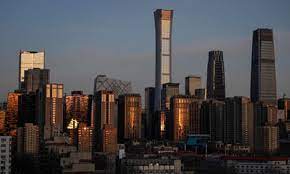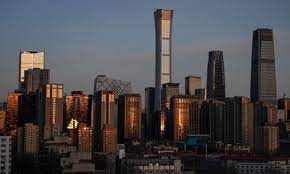
According to a report published by the news agency Reuters citing information from two sources with direct knowledge of the subject, some Hong Kong-based personnel with US consultant Mintz Group have fled the city after the firm's Beijing office was raided by Chinese police in March.
Chinese authorities' investigations into Mintz, as well as US management consultancy Bain & Co and mainland consultancy Capvision Partners, have sent shivers through companies doing business with China, leaving many unsure where red lines exist as Beijing prepares to implement stricter anti-espionage laws in July.
Moving personnel out of Hong Kong quickly demonstrates how the Chinese crackdown has alarmed certain corporations in the global financial hub, many of which are still navigating a national security regulation imposed by Beijing on the city in 2020.
The relocations during the last few months were intended to be a temporary solution to guarantee staff safety, given the uncertainties surrounding the Chinese police investigation, according to the sources, and affected about a half-dozen personnel, including investigators and the head of the Hong Kong office.
One individual with firsthand knowledge of the situation, as well as four other people briefed by Mintz employees, said the firm had conducted corporate due diligence on the probable use of forced labour in supply chains linked to China's Xinjiang region until this year.
Reuters was unable to determine whether the Chinese police investigation was prompted by Mintz's work in Xinjiang.
However, at least two other top executives from multinational due diligence firms operating in China told Reuters that in recent months, officials had specifically advised them against doing such work.
According to one business source who has dealt with Mintz, numerous Hong Kong-based Mintz personnel are presently in Singapore, with no plans to return to Hong Kong until the Chinese authorities' investigation is over.
When Reuters visited Mintz's Hong Kong office during business hours, the doors were shut and the lights were turned off.
Mintz was still paying rent on its office, according to a building management office employee, but two employees at nearby offices stated no one had been seen in the Mintz premises in the last few months.
According to a Reuters analysis of archival versions of the Mintz website, several Mintz worker profiles have been erased. It was unclear what the functions of individuals who had left were.
Mintz would not comment.
Mintz confirmed the raid on its Beijing office in late March, saying it had closed its doors and was willing to collaborate with Chinese authorities to "resolve any misunderstanding that may have led to these events."
While Chinese authorities have not specified the scope of the investigation into Mintz, the office raid and detentions of five mainland Chinese employees, including the head of Mintz's Beijing office, have shook the professional advisory services industry in China, with ripples now being felt in Hong Kong.
Hong Kong, as a worldwide financial capital, has a rich pool of professional services talent, including in corporate investigations, with major firms such as Kroll, Control Risks, McKinsey, and FTI headquartered there.
Following the passage of a China-imposed national security law in 2020, the US changed its risk assessment for US nationals in Hong Kong, emphasising the increased chances of arrest, detention, deportation, or prosecution.
Chinese and Hong Kong officials dismiss Western criticism of the national security law, claiming that human rights are upheld and that similar laws are required by all countries, including the United States.
The Public Security Bureau of China did not respond to Reuters' requests for comment. The Ministry of State Security did not respond to requests for comment.
The State Council Information Office, the Ministry of Foreign Affairs, and the Hong Kong and Macau Affairs Office all declined to comment when contacted by Reuters.
The Hong Kong government stated that it does not comment on specific company decisions.
A slew of laws and regulations enacted during President Xi Jinping's tenure, including cybersecurity, personal information protection, data security, and the upcoming anti-espionage law, which will prohibit the transfer of any information related to national security, have complicated the compliance landscape.
According to two due diligence executives with international corporations who have substantial operations in China, Chinese security officials have held meetings on a regular basis in recent years to offer explicit warnings on areas to avoid in corporate inquiries.
"They would tell us exactly what areas are off-limits," said one executive. "Xinjiang was one of these."
Rights groups accuse Beijing of human rights violations against primarily Muslim Uyghurs in the western region of Xinjiang, including the widespread use of forced labour.
The United States has established a list of corporations sanctioned for utilising forced labour in Xinjiang and has passed legislation requiring them to certify that items sourced there are free of forced labour.
China denies human rights violations in Xinjiang, a key cotton producer and supplier of solar panel materials.
Randal Phillips, Mintz's Asia head and a former senior CIA official, co-authored an article last year on "sanctions due diligence" under the U.S. Uyghur Forced Labour Prevention Act, which is particular to Xinjiang, which has subsequently been removed from the firm's website.
Phillips wrote "for some suppliers, public records and questionnaires may be sufficient; for others, independent verification, on-the-ground investigation and interviews with industry sources may be called for."
(Source:www.reuters.com)
Chinese authorities' investigations into Mintz, as well as US management consultancy Bain & Co and mainland consultancy Capvision Partners, have sent shivers through companies doing business with China, leaving many unsure where red lines exist as Beijing prepares to implement stricter anti-espionage laws in July.
Moving personnel out of Hong Kong quickly demonstrates how the Chinese crackdown has alarmed certain corporations in the global financial hub, many of which are still navigating a national security regulation imposed by Beijing on the city in 2020.
The relocations during the last few months were intended to be a temporary solution to guarantee staff safety, given the uncertainties surrounding the Chinese police investigation, according to the sources, and affected about a half-dozen personnel, including investigators and the head of the Hong Kong office.
One individual with firsthand knowledge of the situation, as well as four other people briefed by Mintz employees, said the firm had conducted corporate due diligence on the probable use of forced labour in supply chains linked to China's Xinjiang region until this year.
Reuters was unable to determine whether the Chinese police investigation was prompted by Mintz's work in Xinjiang.
However, at least two other top executives from multinational due diligence firms operating in China told Reuters that in recent months, officials had specifically advised them against doing such work.
According to one business source who has dealt with Mintz, numerous Hong Kong-based Mintz personnel are presently in Singapore, with no plans to return to Hong Kong until the Chinese authorities' investigation is over.
When Reuters visited Mintz's Hong Kong office during business hours, the doors were shut and the lights were turned off.
Mintz was still paying rent on its office, according to a building management office employee, but two employees at nearby offices stated no one had been seen in the Mintz premises in the last few months.
According to a Reuters analysis of archival versions of the Mintz website, several Mintz worker profiles have been erased. It was unclear what the functions of individuals who had left were.
Mintz would not comment.
Mintz confirmed the raid on its Beijing office in late March, saying it had closed its doors and was willing to collaborate with Chinese authorities to "resolve any misunderstanding that may have led to these events."
While Chinese authorities have not specified the scope of the investigation into Mintz, the office raid and detentions of five mainland Chinese employees, including the head of Mintz's Beijing office, have shook the professional advisory services industry in China, with ripples now being felt in Hong Kong.
Hong Kong, as a worldwide financial capital, has a rich pool of professional services talent, including in corporate investigations, with major firms such as Kroll, Control Risks, McKinsey, and FTI headquartered there.
Following the passage of a China-imposed national security law in 2020, the US changed its risk assessment for US nationals in Hong Kong, emphasising the increased chances of arrest, detention, deportation, or prosecution.
Chinese and Hong Kong officials dismiss Western criticism of the national security law, claiming that human rights are upheld and that similar laws are required by all countries, including the United States.
The Public Security Bureau of China did not respond to Reuters' requests for comment. The Ministry of State Security did not respond to requests for comment.
The State Council Information Office, the Ministry of Foreign Affairs, and the Hong Kong and Macau Affairs Office all declined to comment when contacted by Reuters.
The Hong Kong government stated that it does not comment on specific company decisions.
A slew of laws and regulations enacted during President Xi Jinping's tenure, including cybersecurity, personal information protection, data security, and the upcoming anti-espionage law, which will prohibit the transfer of any information related to national security, have complicated the compliance landscape.
According to two due diligence executives with international corporations who have substantial operations in China, Chinese security officials have held meetings on a regular basis in recent years to offer explicit warnings on areas to avoid in corporate inquiries.
"They would tell us exactly what areas are off-limits," said one executive. "Xinjiang was one of these."
Rights groups accuse Beijing of human rights violations against primarily Muslim Uyghurs in the western region of Xinjiang, including the widespread use of forced labour.
The United States has established a list of corporations sanctioned for utilising forced labour in Xinjiang and has passed legislation requiring them to certify that items sourced there are free of forced labour.
China denies human rights violations in Xinjiang, a key cotton producer and supplier of solar panel materials.
Randal Phillips, Mintz's Asia head and a former senior CIA official, co-authored an article last year on "sanctions due diligence" under the U.S. Uyghur Forced Labour Prevention Act, which is particular to Xinjiang, which has subsequently been removed from the firm's website.
Phillips wrote "for some suppliers, public records and questionnaires may be sufficient; for others, independent verification, on-the-ground investigation and interviews with industry sources may be called for."
(Source:www.reuters.com)














